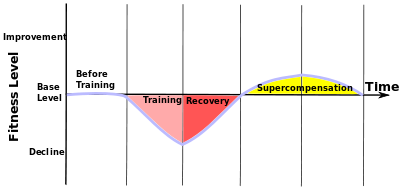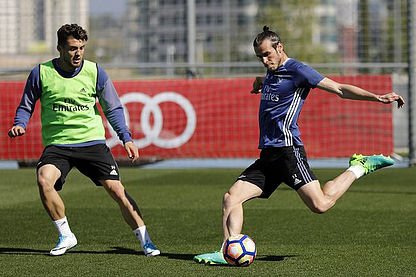Today I’m starting with the basic principles and in future posts I will go deeper into this topic and write more about what to eat and easy tips and tricks for fine tuning your training. Now without further introduction let us start!
The 5 training principles: The 5 training principles are the foundation of getting stronger, leaner and better in every sport. These principles are not only being used in the gym by bodybuilders or fit girls but also by medal winning champions in every kind of sport. Unfortunately, the majority of casual sport fanatics aren’t aware of these principles and this means that they are missing a key ingredient in there knowledge how to get better in the sport they love. So, let me talk you trough these principles and why you should know them and embrace them from now on.
Principle 1: Supercompensation
First let me say that all of the five principles are even important, but this one feels for me the most underrated and at least for me the most important of all the five. Yes I know that doesn’t make sense since I said that all of the five are even important, but let me explain it and I think that you probably will agree with me.
Supercompensation is the principle that you hear in a lot of songs and sayings under the term of ‘ what doesn’t kill you makes you stronger’. If you ever questioned that saying, well I’ve we only talking about the physical side of humans then this saying is more then true. Supercompensation works like this:

In this picture you can see how supercompensation works. No matter if you’re a beginner or a hard-trained veteran this will always be the same for everybody. You start at the Base level. Let’s take a beginner as example: When you start working out for the first time you’re at the Base level, this means the beginning of your training. When you start working out, you are damaging the muscle (fiber) what means that the muscle is being broken down (but this is a good thing!) You can see the muscle breaking in the pink section. When you’re done training, you start to rest the muscle (the dark red) and the muscle will recover.
The true beauty of the human body is that It will always want to prevent that these muscles will be broken down again, so the human body doesn’t only repair the muscle, but it also makes the muscle a little bit better than it first was. And that ladies and gentlemen, is called ‘supercompensation’. You can see the supercompensation in the yellow section.
But wait! There is more! As you can see, the yellow section has a peak and from there on it will go back down to the base point. That means that if you’re training smart, you will take advantage of the supercompensation and train the muscle again when it is reaching the peak of the supercompensation. Usually this is when you muscle pain (soreness) is just over (for a beginner. But for a training veteran It could be 24/72 hours after the muscle training). When you wait longer then 48/96 hours after your muscle pain (soreness) is over you will be back at the base level point, which means you have to start again where you began.
Principle 2: Overload The second trainings principle is ‘Overload’ and this is what the Cambridge dictionary says about it:‘to give someone more work or problems than they can deal with‘ . This is exactly what it means when we are comparing it to training our muscles. Overload means that you give you muscle more work/training/weights then I can deal with at that moment. Overload is needed to reach supercompensation in your muscles. As I told in the supercompensation part ‘ The true beauty of the human body is that It will always want to prevent that these muscle will be broken down again, so the human body doesn’t only repair the muscle, but it also makes the muscle a little bit better then it first was’.
This means that when you are doing the exact same training as you did before the supercompensation your muscle won’t break or hurt, because they have adapted. They now can handle the work/training/weights. This part is when overload comes in. In order to reach supercompensation again, you have to make your muscles work harder than the last time you have trained. You can accomplish this by doing more reps, sets, exercises or increase the weights you are using. When you apply this method in your training, you will definitely create muscle damage again and therefore create supercompensation.
Principle 3: Specificity This principle is very short and easy, but very important.
My health and fitness teacher always said the same thing to us: ‘ If you want to get bigger legs, then train your legs, if you want to learn how to shoot a ball harder at the goal, then train your shot’. What he meant is, sometimes different kind of training methods can come together and can help each other. But if you want to get better in one aspect of training, then your main training should consist out of that part of the training.

Principle 4: Variation The fourth principle is variation, and I’m guessing that the majority of the people who are reading this by now slowly are beginning to understand what I could mean with this. As I told in principle one and two our body needs to overloaded to break down muscle so the supercompensation can start so that we can become bigger and stronger. But what I also told is that our body is a master in adapting and that it will do anything to prevent that muscles will be broken again. Even when you’re overloading your muscles with everything your body wants to adapt from it and we (the trainers) don’t want that to happen. So, the best way to scare our muscle and body is with the variation of different training types and exercises. For example: If you are training hundred days and in those hundred days you are doing the same exercises, but with the overload principle applied to it, then you are sure that you are making gains/building up muscles. But! I can guarantee you that when you are training those hundred days, with the overload principle applied but with different exercises every two weeks, your gains/muscle builds will be a lot higher and better. Why you are asking? Because you’re not giving your body the chance to adapt to the exercises.
Principle 5, the last chapter: Reversibility I’m almost pretty sure that a few of you have heard the following saying: ‘If you don’t use it, you lose it. Unfortunately, this is what happens when you stop training especially when you’re just a beginner. For example, this is what happened to a friend of mine:
He started training out with me, because he wanted some guidance and help when he first started with fitness and I was glad to help him. For somebody who had never trained before he was really learning fast and he was super motivated (like most people in the beginning). After two months he was seeing his first gains, so his motivation went up and up, he was literally training like a beast, five times a week. Then after 3 months his motivation slowly fainted and on top of that he met his girlfriend. What we all know means that in the beginning of your relationship, that is all you want to spend your time on, me included. So, he stopped training and I didn’t see him in the gym for, well... never. Not even two months later, after he stopped training, we went to the beach with some friends and our girlfriends and when he took of his shirt, all his hard-worked gains were gone. 3 months of training just vanished like that! What a shame.
So the point I’m trying to make with this, make sure you always keep doing something, especially when you are new to training. When you are training 5+ years It isn’t a big deal when you stop for 2-4 weeks because you’ve built up a buffer. But any longer than that will be paid with muscle lost.

Well people, I hope you have enjoyed this post! In the future I will be posting more articles about these kinds of topics. I you have a question, or a request let me know in the comments and I will see if I can write something about that!
Don’t forget to upvote and follow me if you liked my post! A follow will always be returned with a follow, because I’m not only here to write and earn money but also to learn from your story’s!
Congratulations @donhiddit! You have completed the following achievement on the Steem blockchain and have been rewarded with new badge(s) :
You can view your badges on your Steem Board and compare to others on the Steem Ranking
If you no longer want to receive notifications, reply to this comment with the word
STOPVote for @Steemitboard as a witness to get one more award and increased upvotes!